- Home
- Alison McGhee
Shadow Baby Page 2
Shadow Baby Read online
Page 2
I had hoped for an immediate answer. But immediate answers were not forthcoming from the old man. That was one of his traits.
The Adirondack Ski Club created the ski trail from Utica to Old Forge, fifty miles of cross-country skiing. The night I first observed the old man, they had just finished the portion that wound its way through Nine Mile Woods and up through Sterns. Would you find me skiing on that trail? Would you find me out on a winter night, a scarf wrapped around my face, poling my way through the snow?
You would not.
I had a feeling that the old man knew the power of winter. How did I know that? Because when I told him why I spell my last name with a lowercase w, he nodded. He did not question. I used to love that about the old man.
The first night I ever met the old man, sitting at his kitchen table, I read a book report aloud. You might think that seems like a strange thing to do. You might think, Tamar is right, Clara Winter is indeed an odd child. But still, there we sat, me reading, him listening.
They like us to read a book and do a book report on it once every two weeks. “Now that you’re in sixth grade,” they say. “Time to develop your critical faculties.” Etcetera. I scoff at this. Their definition of a book and my definition of a book do not coincide. “Fifty-page minimum,” they say.
What kind of book is only fifty pages long? A comic book?
It hurts me to see a book report. It’s painful to me. Book reports are to books what (a) brown sugar and water boiled together until thick is to true maple syrup from Adirondack sugar maples, (b) lukewarm reconstituted nonfat powdered milk is to whipped cream, and (c) a drawing of a roller coaster is to a roller-coaster ride. Give me a real assignment, I say.
I like to read books one after another. Immerse—another perfect word—myself in a book and then immerse myself in the next book, and just keep going until there aren’t any more books left to swim in. That’s why I hate it when authors die. I cannot stand it. There will be no more books forthcoming from that person. Their future books died with them. In the past I have found a series of books and loved it so much that all I wanted to do was read and read and read those books for the rest of my life. Then I would find out that the author was dead. Had in fact been dead for many a year. This has happened to me several times.
You can see how much it would hurt me to write a book report every two weeks. I could do such a thing only to a book I hated. And why would I read a book I hated? Self-torture?
My only option is to make them up.
Besides, there’re not too many unread-by-Clara-winter books left in the school library. It’s a strange feeling, to walk down a row of books with your head bent so you can read the titles, and recognize most of them. Amelia Earhart: American Aviator. Alexander Graham Bell: Inventor of the Telephone. George Washington Carver: American Botanist. I like biographies. I like the early childhoods of famous people. Sometimes they’re what you’d expect them to be, sometimes they’re not.
I like reading between the lines of famous early childhoods.
My favorites are pioneers. Winter explorers. The kinds of pioneers who bore the burden of snow and ice, who faced the cold head-on. Winter is to be feared. But who thinks about that now? Everyone thinks we’ve conquered winter. Houses with heat, cars with heat, stores and schools with heat. They forget what it used to be like. They can’t begin to imagine what it was like for the pioneers, with one small fire in an unchinked cabin, or how cold it must have been in the Indians’ winter camps.
Imagine it.
We are close to death every winter day. What if the furnace went out and the electricity went out and the phone line went out and the blizzard raged so hard that the road was a pure whiteness, and you slowly burned up everything wood in the house, and then twisted newspaper into tight rolls and burned them like fast-burning logs, and then started in on your summer clothes and the sheets and towels and mattress stuffing and anything else that could possibly burn, and finally, even, tore all your books apart and burnt the pages, all the time jumping up and down to stay warm, dancing even, with all your winter clothes on? It wouldn’t matter. You would die. No one thinks about things like that. They all feel so safe.
Not me.
“Would you like to read my fake book report?” I said. “I have it here in my backpack. It was completed just this afternoon.”
The old man stirred his coffee with the handle of his spoon. He did not use the bowl of the spoon, as I have seen it referred to in books but never, not once, in real life.
“It concerns winter,” I said.
“You read it to me,” he said.
The Winter Without End, by Lathrop E. Douglas. New York: Crabtree Publishers, Inc., 1958. You need to make up a title that sounds possible and an author that doesn’t sound impossible. I always put down a year from long ago, just in case they check. They’d never check, but still. You could always say, “Oh, you couldn’t find it? That’s because it’s out of print.” They’d be impressed that you knew what out of print meant.
“Ready?” I said.
“Ready.”
It was the longest winter that Sarah Martin had ever known. Growing up on the Great Plains, she had known many a stark December, many an endless January, and the bitter winds of February were not unfamiliar to her. She was a child of winter. But that winter—the winter of 1879—Sarah knew true cold.
The potatoes had long since run out, as had the cabbages and carrots buried in sand in the root cellar. The meager fire was kept alive with twists of hay. When the first blizzard came, followed every few days by another, Sarah’s parents had been trapped in town. It was up to Sarah Martin to keep her baby brother alive and warm until the spring thaw, when her parents could return to the homestead.
The true test of Sarah Martin’s character comes when her baby brother wanders into the cold in the dead of night. Sarah blames herself for this; she was too busy twisting hay sticks in a corner of the cabin to notice that he had slipped from his pallet next to the fire and squeezed his way outside. “He’s only two years old,” thinks Sarah. “How long can a tiny child survive outside in this bitter cold?”
Will Sarah Martin be able to find her little brother in time? Will she be able to rescue him from a fate so horrible that she cannot bear to think about it?
Did Sarah Martin have the foresight to dig a snow tunnel from the house to the pole barn where Bessie and Snowball are stabled? Or is there nothing beyond the cabin door for her beloved brother but blowing snow, bitter wind, and a winter without end?
Will Sarah have to face the responsibility of her brother’s death?
Will her baby brother be forgotten by everyone but her?
Will she miss him her whole life long?
Read the book and find out.
I live in North Sterns, in the Adirondack Mountains. Winter loves these mountains. Snow is attracted to them. Snow craves falling here. Snow falls on the young and the old, the quick and the dead, the CJ Wilsons and the Clara winters.
“Well?” I said to the old man after I read him my fake book report. “What do you think?”
He stirred his coffee so that it slopped into the saucer.
“What happened?” he said. “How does the story turn out?”
“Read the book and find out,” I said.
Most of the time I give my book reports a happy ending. The teachers expect that. An unhappy ending would raise alarm bells in their minds. That’s because most books for children have happy endings. Few end in tragedy. Few contain irredeemable loss.
You might wonder why a girl of eleven would want to be around an old man seven times her age. You might wonder why she craved his presence, what she was hoping to find in Georg Kominsky. You might wonder if she found it.
“Tell me how the story ends,” the old man said when I finished reading the fake book report. “I would like to know what happens.”
So would I.
Chapter Two
Soon after I met him, I told the old man about my miss
ing lantern earring. I was making toast for myself and mixing up the coffee in his mug. You had to put a saucer underneath it. That’s how he drank his coffee. He poured the milk in and then he stirred and stirred and stirred with the handle of his spoon until it slopped into the saucer, and then and only then would he take his first sip. I soon learned that about the old man.
“My lantern earring has met a tragic end,” I said.
Tragic is a good word. It would be a good name too, with that soft middle “g,” except it’s not a name. You couldn’t name a baby Tragic. That would be a travesty, which is also a beautiful-sounding word. Travis is the closest you could come to that one.
“My earring shall not see the light of day again,” I said. “Swallowed by the snow like Jonah was swallowed by the whale.”
It was my favorite pair of earrings, tiny silver lanterns like the kind pioneers used to light their way in the barn at choretime. They were a gift for my tenth birthday, before I ever met the old man. Once in a while Tamar used to give me earrings, but only tool earrings, in keeping with her theory that work makes you strong. I used to have a set of hammer earrings, a set of pickaxes, a pair of scissors, all made of silver. But I lost one of each set. That’s what happens when you wear clip-on earrings. They disappear. I would never have lost my lantern if Tamar had let me pierce my ears. The one fell off, to be lost forever in the snow.
“Two more years before Tamar will let me pierce my ears,” I told the old man. “A veritable lifetime.” Veritable belongs to me. It’s one of my words. I like the way all the syllables after the “ver” go mumbling into each other.
“Two years is not a lifetime,” the old man said.
“Nay sir, but it is 730 days. If it’s not a leap year.”
That’s one of my talents. I can add extremely quickly in my head. Let me tell you a secret. As long as people believe you’re an extremely fast adder, it doesn’t matter if you make a mistake. No one notices. I’ve gotten by quite a few times like that.
Even as I told the old man about it, gravity may have been pulling my silver earring down to the earth, the little lantern dropping crystal by crystal deeper and deeper into the six feet of snow piled beside the entrance to the old man’s trailer park, which is where I lost it. Maybe it would rest on the frozen crust of the ground until the end of April. When spring finally came and all the snow melted, maybe then it would be carried away by flooding, swept into Nine Mile Creek, and from there into the Utica Wetlands, to sink into the swampy mud without a trace.
“Ne’er to be seen again,” I said to the old man.
It all comes back to snow and cold.
• • •
The old man planned to make me a replacement for my lost lantern earring. He had the ability to do that because he used to be a metalworker. There were many things about the old man that no one ever knew. They were all inside him. People thought he was a silent man, but they were wrong.
“Please tell me about your occupation.”
That was a question I asked him in the beginning, when I was still doing his oral history. It was straight from the oral history list they gave us. Did they not trust us to come up with our own questions?
“Metalworker.”
I wrote all his responses down on my roll of green adding-machine paper from Jewell’s Grocery: 3/$1. Mr. Jewell keeps them in a bin up near the register, things that are a little cracked, a little broken, maybe not wanted. Things that they think people aren’t going to want, that’s what goes in the bin. Like adding-machine paper: who’s going to want green?
Sometimes I think of it as my bin.
“I lost my lantern earring,” I told him. “I knew something was wrong. There was just a feeling, like something was missing that should be there. The unbalancing. That lantern earring was heavy.”
I showed him the one earring that was left.
“Early American,” he said.
“Maybe.”
“No maybe,” he said. “That’s a traditional American copper or tin lantern pattern.”
“It’s sterling silver,” I said. “It was my tenth birthday present from Tamar.”
He examined it. He tossed it from hand to hand for a little while.
“Paul Revere,” I said, when I saw that he had stopped talking again.
Paul Revere was an early American man. I figured it might get him back on the talking track. I used to do that sometimes, let a name or a word drop into the air in front of the old man’s quiet face.
“I read his biography,” I said. “I took it out of the school library.”
There’s a Paul Revereware factory right in Rome, just fifteen miles from Sterns. The factory has a galloping red neon horse on the front of it. At night it’s very bright.
“It took Paul Revere a long time to get his first silver pitcher made small the way he wanted,” I said. “He couldn’t get the proportions right. He had to figure out how to reduce and enlarge proportions without destroying the inherently graceful line of the original silver pitcher.”
I like to talk like that, which is the way certain books are written.
“Do most eleven-year-olds talk like you?” the old man said.
“Nay sir, I think not.”
Pioneers may have talked like that. It’s hard to know. They didn’t have tape recordings back then. It’s all speculation, how they really talked. That’s why I started writing down the story of the old man’s life, because he didn’t talk to anyone else and there was no one else to listen anyway. There needed to be a record of his life. That is what I believed to be true.
“Do not forget, however, that I am not merely eleven,” I said. “I am even now in my twelfth year.”
He smiled. No one else would have noticed but me, because I’m the only one who knew the looks on the old man’s face well enough to tell what was a smile and what was a grimace.
“I used to make lanterns,” he said. “Like your earring but big. Tin, mostly.”
“Tin?” I said. “Tin.”
Not a good sound, tin. Too short. Too abrupt. Too tinny.
“How about aluminum?” I said.
“What do you mean, how about aluminum?”
“Like soda cans. Like tinfoil.”
“There is possibility in aluminum too,” he said.
Possibility. A five-syllable word. If every finger is a syllable, possibility uses one entire hand neatly and nicely. It takes a tinsmith, someone who knows sheet metal, to see the possibility in aluminum. After the old man said that I started seeing possibilities myself. I looked up aluminum and tin in the library. You can find out a great deal from one half hour well spent at a library. I tested the old man after I had done my research.
“What sort of metal is tin, and is it commonly used by itself?” I said.
“Soft, white, and no.”
“What metal, when combined with tin, forms bronze?” I said.
“Copper.”
“Tell me the melting point of tin.”
“450. About.”
He knew his stuff. The old man really knew his stuff when it came to sheet metal. That’s why he had the capability of making me a matching lantern for my one remaining silver earring.
“I learned how to make real lanterns that look like your earring when I was a child,” the old man said. “Decorative tin lanterns.”
There are people who would not have understood the old man when he said “decorative.” There are people who would have gotten twisted up in the old man’s pronunciation, gotten lost in the vowels and consonants, given up in despair.
Not me. I understood the old man. We were compadres.
The old man’s father may have been a metalworker too, with a forge in a shed near their thatched hut. That’s how I picture the old man when he was a boy, living with his mother and his father in a thatched hut with an open cookstove in it. Walls made of turf bricks. Every few years the old man’s father repaired the thatched roof, or even tore all the thatch off and started again. Their hut was
on a street with many other neighboring huts. Horses and wagons clopped up and down the rutted muddy road. No cars. All day Georg’s father worked in his forge, pumping air at the fire to keep it hot, banging and pounding on metal things such as horseshoes and anvils.
Georg’s father was the town blacksmith. After school, which lasted only half a day, Georg would come immediately home, eat the bread and butter that his mother had ready for him, and go directly to the forge. It was from his father that Georg learned all he knew about metalworking. Georg’s father was a stern but kind teacher. He wanted his son to grow to love working with metal as much as he, the father, loved it.
“For a skilled metalworker there is always a job,” he told his son Georg. “Learn the trade well and you will never go hungry.”
Georg’s father sometimes did favors for his friends, straightening a horseshoe or bent nails without charging. He was known in the village as a generous and honest man. A beggar could always find a hot meal at the home of Georg’s mother and father. From his father Georg learned the tools of the metalworking trade and much more. When school was out for the summer they worked together from sunup to sundown, then they would put away their tools for the night and go next door, where Georg’s mother had dinner and tea waiting for them. Glasses of hot tea, strong and plain for Georg’s father, half-milk for Georg.
In this way Georg learned, without haste, the ways of metalworking.
His particular gift for decorative metalworking was discovered early, when he would take the scraps of sheet metal left over from one of his father’s projects and turn them into beautiful and useful objects, such as miniature lanterns, cookie cutters, and candleholders. Anything that could be made from sheet metal, Georg could make and make decoratively. Friends and villagers soon noticed the unusually beautiful lanterns and candleholders coming from Georg’s father’s forge. When it was discovered that it was not his father, but Georg himself, who was the artisan, word quickly spread.
“He has the touch,” they said.
The old villagers nodded knowingly. They had seen this kind of talent before, but rarely. Rarely, a child is born with the knowledge of past lives still in his fingertips. They believed that Georg was such a child, that he had lived a life before as a forger, as a craftsman, as an artist. In this life, the skills from the previous blended in his fingertips, allowing him to produce useful objects of great beauty.

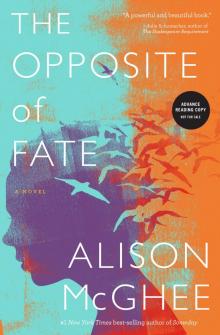 The Opposite of Fate (ARC)
The Opposite of Fate (ARC)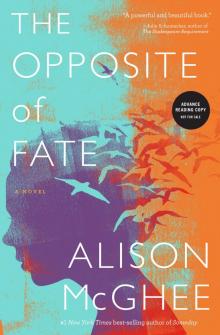 The Opposite of Fate
The Opposite of Fate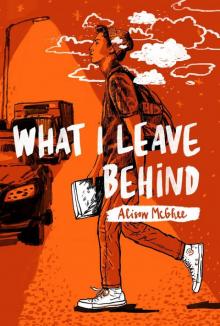 What I Leave Behind
What I Leave Behind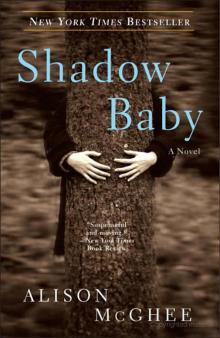 Shadow Baby
Shadow Baby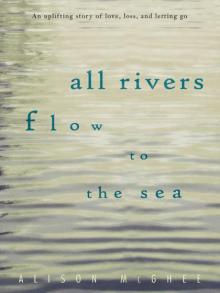 All Rivers Flow to the Sea
All Rivers Flow to the Sea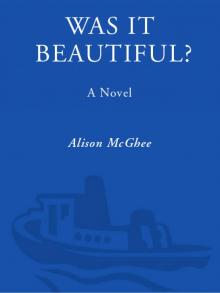 Was It Beautiful?
Was It Beautiful?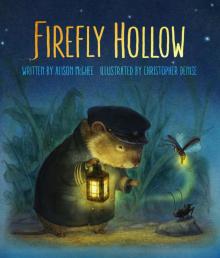 Firefly Hollow
Firefly Hollow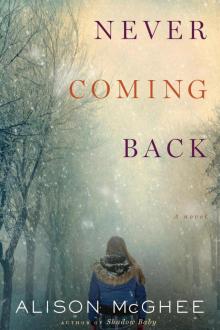 Never Coming Back
Never Coming Back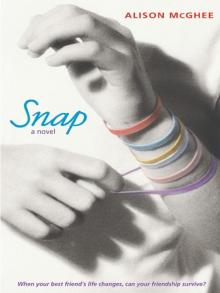 Snap
Snap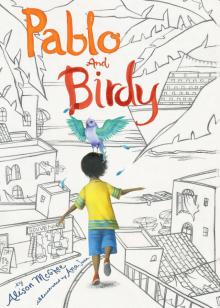 Pablo and Birdy
Pablo and Birdy